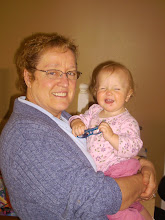Yesterday at about 9:00 p.m. I arrived home after 18 days of travel. We left for South Carolina on January 4th and arrived back in Calgary January 16th. Then I had to go straight to Edmonton for a course, had one day in between and then spent all day yesterday in an Examination for Discovery about the accident a friend had in 2003. I arrived home tired and a little bit sick. Just a bad cold from not sleeping well for at least a week. So you can imagine how good my own bed with the nice warm, thick mattress pad felt to me. Not to mention how the other nice warm comforting body with his arm around me felt while I slept.
What is it that makes me wake up at 4:30 am or even earlier when I am not in my own bed? Is it that I'm not used to sleeping alone and I need that 'heavy breathing' in my ear? Is it that the bed doesn't feel right? Or that I don't have my own pillow? True it is that I normally carry my own pillow with me when I travel but didn't have it this time. I did sleep significantly better in South Carolina even though the bed was narrow and a lot harder than I am used to. But I had a feather pillow, and, of course, the 'heavy breathing.'
If it is the actual bed and other creature comforts I need, I guess that means I am either very spoiled, or else not very adaptable. When children are fussy about the food and don't want to eat, we tell them they must not be very hungry. The same thinking would lead to saying I must not be very tired. Would that were true and I wouldn't have this chest cold right now. I rarely get a cold, less than one time a year. I am certainly tired enough to fall asleep rapidly when I get into bed. I just wake at an uncomfortablly early hour guaranteeing that I will be in truly awful shape before the day is done.
If this sleeplessness is the result of being forced on occasion to sleep alone, that leaves me with a few uncomfortable realities:
1. My bed partner better outlive me since if he doesn't, I would die soon after him anyway, the victim of insomnolence.
2. I better convince him somehow that he has to follow me around. Since I am obviously more effective when not tired, this could be classed as a professional necessity. So far I have had poor success at this, since he does himself have a life and sometimes needs to work -- and works better at home.
3. I should just give it up and follow him around. However, even if this meant better sleep, I too have a life and really enjoy my work. So sometimes I have to be away from home. Not a good choice to give it up.
4. Resort to medication -- well, no, I don't think so.
5. Just get used to being tired sometimes. This week in spite of insomnolence, I did rather well except for the increasing severity of the cold. I guess I will just have to organize things so that I have adequate recovery time after and try to log in extra sleep hours ahead of time.
Unfortunately, I think the last choice is the only one that has any practical value on a consistent basis.
Just in case you think this is a bit trivial, the side effects of chronic sleep deprivation are not nice: suppressed immune response, increased rate of aging (like wrinkling - yuck), weight gain, reduced cognitive function (i.e. you get stupid), that old favorite irritability and in my case, fibromyalgia or aching muscles and increased blood pressure. In addition, sleep deprivation is assiciated with increased risk of type II diabetes and psychoses like bipolar disorder. Linked to aging, animal studies suggest that sleep deprivation increases stress hormones, which may reduce new cell production in adult brains. Since most growth in children occurs during sleep, sleeplessness can result in suppression of growth hormones and therefore of growth in children and aging in adults. These effects are pretty much backed up by research. And it is true that total sleep deprivation results in death for lab animals. http://en.wikipedia.org/wiki/Sleep_deprivation#Counteracting_the_effects_of_sleep_deprivation
On the more cheerful side, although sleep deprivation is a common interrogation/torture technique, and it does feel like torture to me, just one night of good sleep can counteractsthe negative effects.
So sleep tight.
Saturday, January 22, 2011
Subscribe to:
Post Comments (Atom)

No comments:
Post a Comment